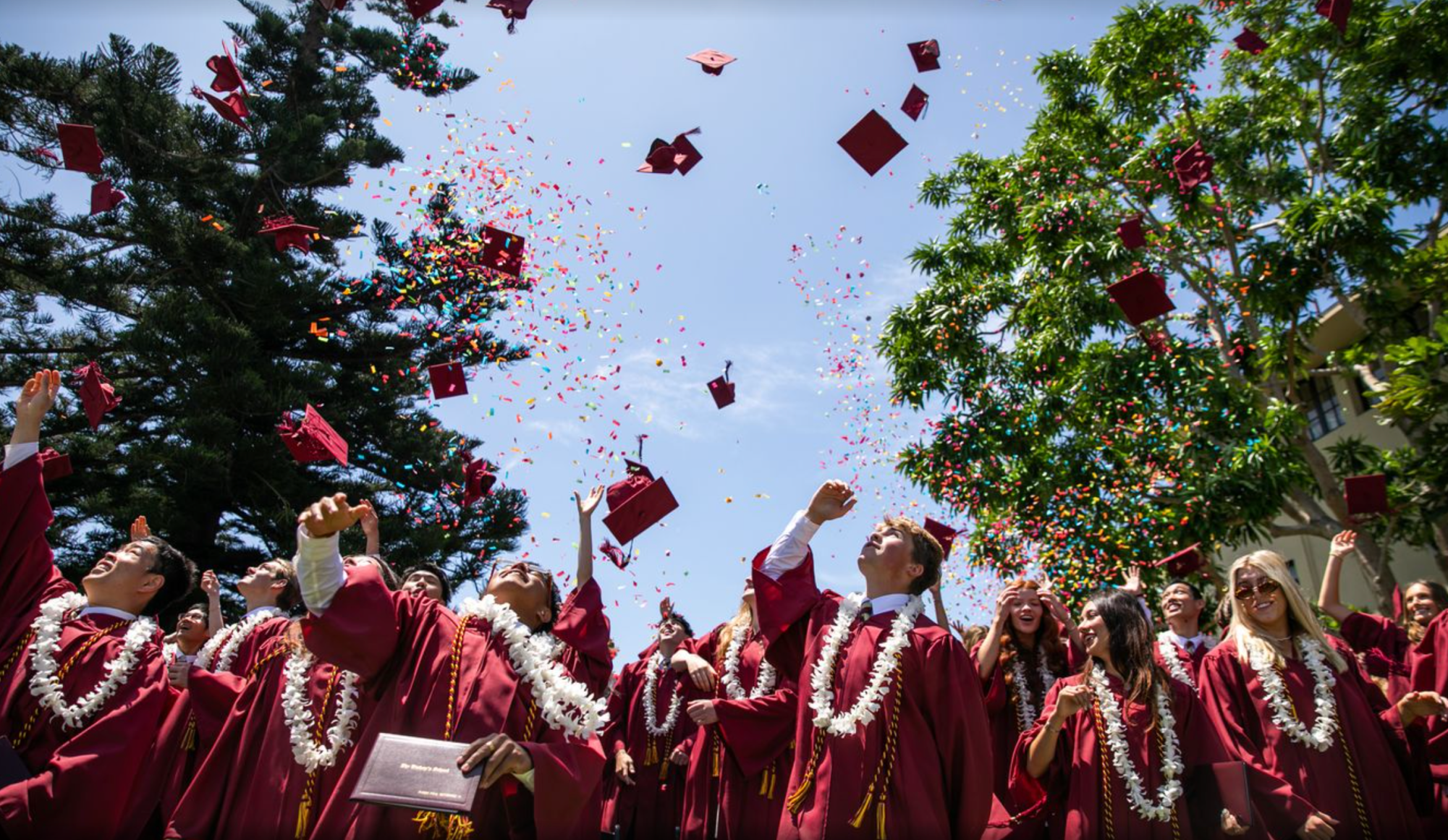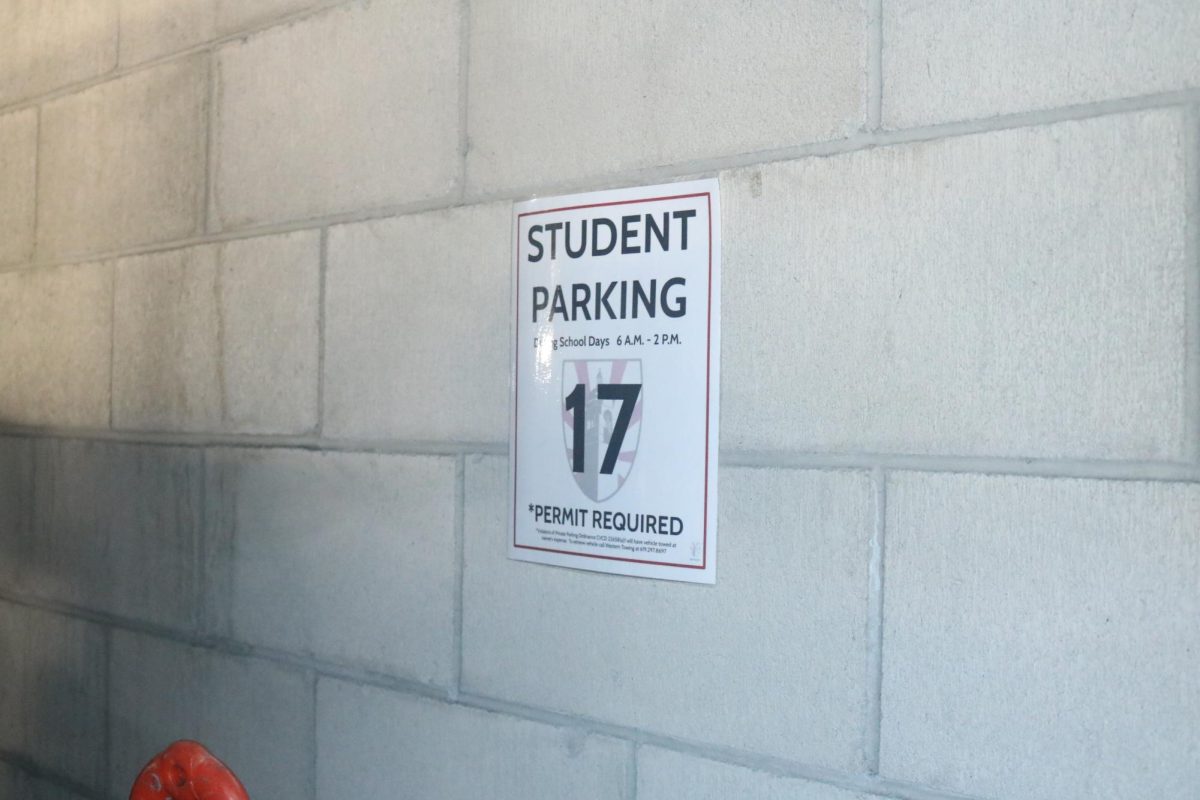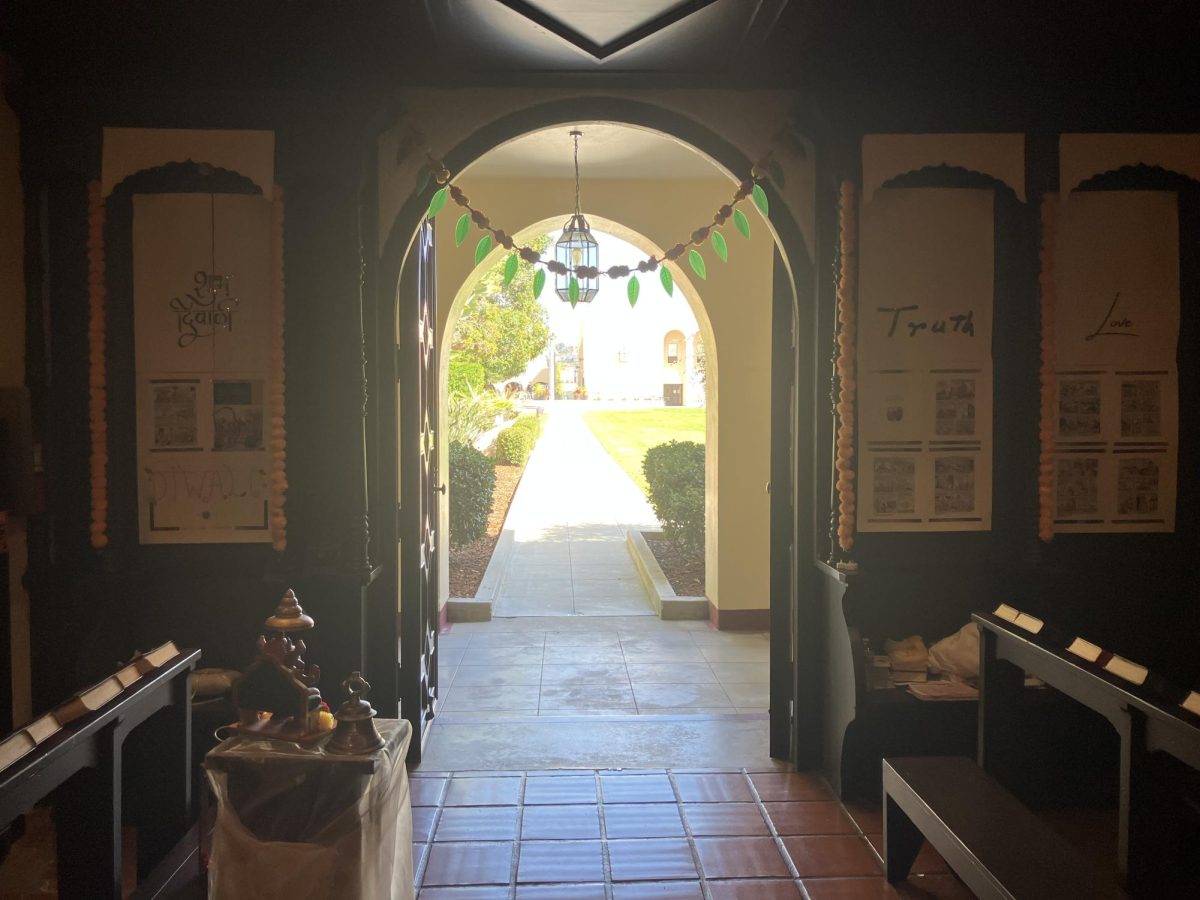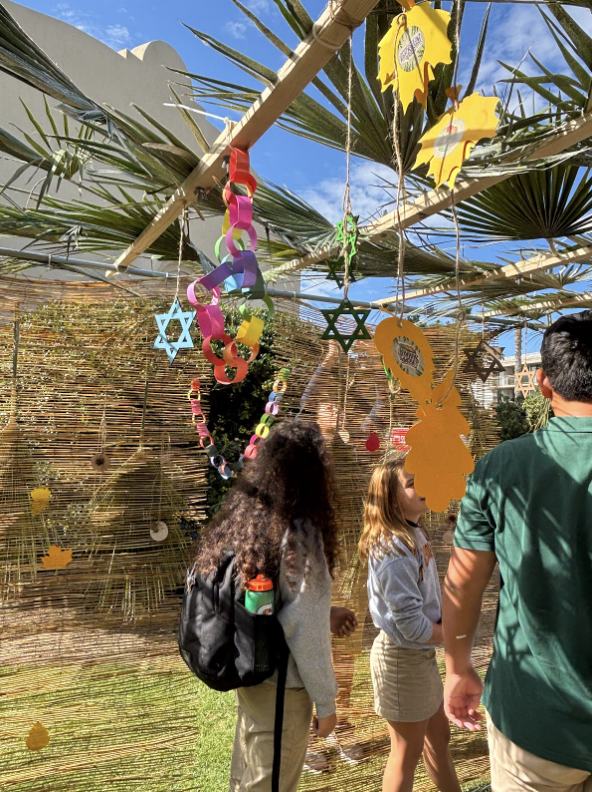Entering a new grade, a winding path stretches out towards the unknown, and we all feel nervous, excited, and uncertain about what’s to come. Starting a new grade means facing a different workload, new social dynamics, new expectations both in and out of school, and sometimes, it helps to have a sense of what lies ahead — advice for challenging classes, time management, friendships, and more.
Whether you’re a 6th grader new to Bishop’s, an incoming freshman transitioning into high school, or a senior entering your last school year, hopefully your uncertainty can be alleviated by those who have just walked in your shoes.
6th Grade — Advice from the Class of 2031
Candice Ding (‘31) explained, “One mistake I would warn someone else to avoid is having a negative mindset towards classes, especially the rotation classes like language and arts.” She described how participating is hard when you have a negative mindset, and if you don’t participate, “you might have a negative impact on the teacher.” Julianna Finney (‘31) agreed with the importance of participation and added, “If you engage and ask questions (even if you ask a lot of them), you will end up with a much better understanding of the material than otherwise.”
Candice also described how “near the end of the school year, you get to choose what language you want to take,” and suggested choosing based on your own interests instead of only doing what your friends do, because “what they like might not suit you.”
Tyler Yee (‘31) explained how teachers will encourage you to take advantage of office hours — and to listen to them. Tyler, Grace Bull (‘31), and Trevor Smith (‘31) were all much more successful in class because of it. Grace said, “If I knew this before starting [6th grade], I would have gone more in the beginning of the year.”
Trevor added that when he went to the gas station with his friends instead of going to office hours when he needed to, “I had extra homework to do when I got home and was confused on the study guide for the test.” Trevor emphasized having a balance: “You should tell your friends that you can hang out or go to the gas station another time and go to office hours.”
Neil Driscoll (‘31) also suggested carrying your stuff with you instead of using your locker. “Using my locker made me late to my classes because I had to run to my locker to get my stuff,” he said.
7th Grade — Advice from the Class of 2030
Valerie Combs (‘30) and Jackson Jhang (‘30) both explained that they wish they had known to read the Daily Bulletin carefully in order to stay informed about new opportunities to try something new. Jackson said, “In 7th grade, there were many exciting opportunities offered to students, like different clubs, new sports, and participating in middle school plays. While I enjoyed a lot of these activities, I wish I had tried even more.”
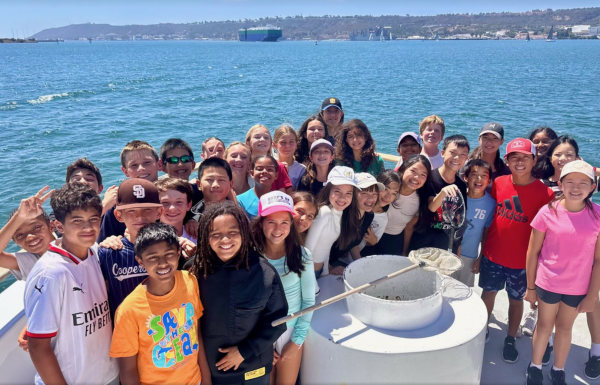
Charlotte Leach (‘30) agreed, saying, “The biggest thing I think I would have loved to know before seventh grade is the amount of resources that I had available to me.” She specifically described how the Learning Center was a great source of support for her. “It’s important to stay educated about resources for academic and mental prosperity,” she concluded.
For seventh graders new to Bishop’s, Olympia Georgiou (‘30) recommended asking a friend who is returning from Bishop’s about the clubs they go to. In addition, Olympia explained, “Lunch clubs are a great way to meet people that aren’t in your classes or make friends in other grades.” She also suggested utilizing X-period to try something new instead of enrolling in study hall. “In seventh grade, you won’t get enough homework or assignments to warrant taking study hall as your elective. Middle school is the time to discover new passions and try new things,” she said. “Attempting a different sport or activity is always super fun and is another great way to make friendships within your own grade and throughout middle school.”
Academically, Valerie suggested doing all of the practice sentences teachers assign for a grammar assessment instead of reading over the answer key and going to office hours constantly and early. Practice problems aren’t only for English; Phoebe Coppedge (‘30) added that she asked for extra practice problems at math office hours, and “quickly got on top of things.” Phoebe also recommended engaging with your teacher, saying, “Not only did I grow academically, I also learned that our teachers are always there to help take us to the next level.”
For tips outside of academics, Victoria Miyamoto (‘30) suggested staying away from drama. “You might want to spread a secret or rumor you just heard, but it could actually hurt friendships and start unnecessary beef,” she said. “In 7th grade, just have fun and create amazing memories with friends instead of dealing with drama.”
8th Grade — Advice from the Class of 2029
“8th grade was a pretty big step up from 7th,” Kyle Wang (‘29) said. “I remember my high school friends telling me to relax and enjoy it while I could, saying that high school would be much harder. Taking their advice, I didn’t try much at first.”
Noelani Lasua (‘29) agreed and said that her teachers went into the material at a much faster rate than she expected. “If I were aware of diving into subjects at a faster rate, I would’ve spent a focused week beforehand brushing up on those key topics,” she explained.
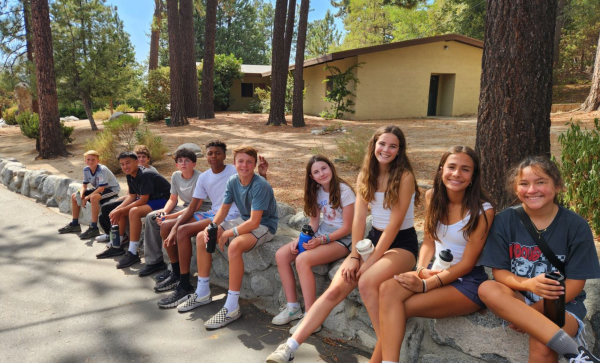
However, not letting “being comfortable turn into autopilot,” as Isaac Smedra (‘29) put it, is a good opportunity for students to try something new, take advantage of the resources Bishop’s offers, and build up effective study habits.
Isaac added, “It’s easy to fall into the same routines without noticing. Talk to someone new in class, say what you actually think in English class instead of being nervous that you are wrong…I think I missed a few chances to grow.”
Isaac suggested to “pursue all the opportunities and resources you have here at Bishop’s.” For Adrian Fong (‘29), this was using club fairs to look into possible extracurriculars for high school. “When 8th grade begins, and all the clubs and service fair attractions come out, poke around. Poke around and see things you think you might want to do, the things you can see yourself doing,” he said.
Class of 2029 students also revealed some study habits and tips they developed throughout the school year.
To mitigate procrastination, what helped Noelani most was building small habits throughout the semester to help her feel more confident and prepared for cumulative week. These habits were routinely “starting assignments early and checking in with teachers during office hours,” and making a to-do list. “When you’re stressed, don’t try to tackle everything at once. A [to-do list] keeps you organized, focused, and a lot more productive,” she said.
Weston Meisel (‘29), Tanush Iyer (‘29), and Ellie Mafong (‘29) emphasized the importance of going to office hours. For English, Weston recommended going to office hours “when there are essays assigned or any assignments that you’re only allowed to do in class, because you can put at least a full class’s worth of work into that assignment more than others.”
Ellie added that going to office hours helped her with not getting similar questions wrong on every test in 3E Math. She also suggested dedicating some pages of your math notebook to writing down the questions you got wrong and reviewing them before a test.
Lauren Kim (‘29) found that, for science class, it was helpful to participate in lab discussions instead of staying quiet and “writing down whatever [your] table mates write down.” Science tests “require you to connect and simulate concepts instead of just knowing their definitions,” and discussing with table mates helped her with this. Madison Navarrete (‘29) suggested intentional note-taking to avoid “having to re-read a whole lesson or chapter just to find the answer.” The most important thing about note-taking, Madison said, was to break down the information on the board into your own words. “Notes should help and make sense to you,” she said.
Audrey Duehr (‘29) recommended prioritizing your well-being over making your assignment “perfect.” She said, “If it’s 11 PM and you’re still tweaking a paragraph, just pause and go to bed.” She added that if you were honest, your teachers would understand. “You should always give yourself permission to let go of things, because if you understand things may not be totally perfect, school will be a lot less stressful,” she explained.
Lastly, as Ari Borkar (‘29) said, don’t forget to enjoy your last year of middle school! “Spend as much time as you can with your friends. Classes and homework come and go, but the weird conversations, dumb group chats, and laughing over absolutely nothing during lunch are what you’ll actually remember. Don’t rush through the year. Just enjoy it while it lasts,” Ari said.
9th Grade — Advice from the Class of 2028
Abigail Wiener (‘28) and Edward Baek (‘28) described how 9th grade can feel overwhelming, especially because there are so many new clubs to get involved in and activities to explore. Abigail explained that, alongside her seven classes, “it started to become difficult to balance all my new commitments and the new level homework with my life outside of school.” Specifically, Abigail struggled with balancing volleyball and the fall play, and at first, she would “go to the last 30 minutes of practice after a 2-hour rehearsal.”
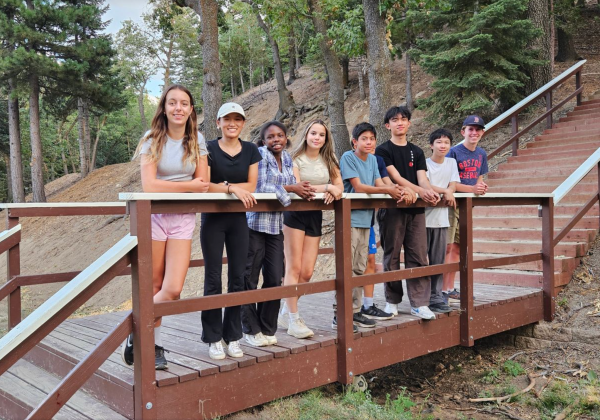
Abigail learned to prioritize, only going to volleyball when it didn’t conflict with the play. She said, “You should absolutely try new things and get involved, but just make sure that you have enough time to be with people that make you happy and to take care of yourself and your mental health as well.”
Edward explained that overwhelming yourself can come from pressure to “join every single club” because of worries about extracurriculars. Instead, he recommended “finding something you like rather than doing something just because it seems like a good extracurricular, or just because your friends are doing it.” For example, Edward tried out MUN at the beginning of the year, and because he realized it wasn’t something he was interested in, he left to allocate more time to the activities he liked, such as badminton, volunteering, Associated Student Body (ASB), and basketball.
Edward and JT Cochrane (‘28) also emphasized the importance of using your free time wisely at school. “Everywhere you go, it will be chaotic,” Edward explained, because in freshman year, everyone has X period free. Edward recommends that if you have a free period, X period can be used to relax. “At the start of the year, a lot of people use X period to study, but soon everyone realises that they need some time to rest,” he said.
However, this free time should be used wisely. If you don’t have a free period, workload can pile up, and Edward explained that “it takes time for you to adjust to upper school academics.” Thus, JT said, “One thing I wish I knew is that you will have more free time in upper school, but you have to use it more intelligently. Any free time that you guys have should be used to help you do productive things. It makes a huge difference for the rest of your day.”
Managing your time when you’re studying is also important, as Hritika Hosalkar (‘28) said, “there was an increasing demand for a greater depth of understanding of the material and topics.” Hritika explained that in middle school, she tended to study through memorization, but as the workload increased, that strategy didn’t work anymore. “Trying to ‘study’ through memorization in all of my classes was spreading myself far too thin,” she said.
“I caution all incoming freshmen to spend the first quarter of the year finding actual ways of understanding that work for them,” Hritika said. “As classes will continue to get harder, it will prove far more useful to focus your energy on something that you know already works for you.”
Ninth grade can also be challenging for new students at Bishop’s because of the social transition. Jojo Perham (‘28) reflected, “I wish I had known that making friends doesn’t happen all at once — and that’s okay.” Jojo gave herself pressure to find “her people” quickly, but explained, “I’d be more patient and open, let people get to know me gradually, and lean into the things that make me different — my sense of humor, my interests, my strong and loud passion for spirit of all kinds. That’s what eventually helped me find friends who liked me for me.” Real friendships take time, as Jojo said, “Don’t rush it. Be visible in small, consistent ways — say hi, join a club, make a joke in class — and the right people will find you.”
9th Grade Classes
Modern World History
Elaine Wang (‘28) explained that Modern World History is hard “due to the amount of memorizing you have to do, along with the essays you have to write.” The large amount of dense material made it impractical to study the night before a test or solely re-read notes.
Sarah Balfour (‘28) and Sanjeevni Vaidya (‘28) recommended studying with others or explaining things out loud. “Often, the material for this class was easy to read about but hard to understand unless you could explain it to someone else, ask more in-depth questions, and have a conversation about the material,” Sarah said. Sarah found that going to office hours and listening to other people’s questions, the teacher’s answers, then explaining what she knew to someone else helped her. Sanjeevni added that explaining out loud “helped solidify dates, events, and complicated cause-and-effect chains,” which was much more effective than re-reading her study guide. “Make sure to do it from memory, so the moment you hesitate, you know how to review,” she explained.
Sherry Huang (‘28) and Elaine suggested creating study guides early and filling them out throughout the unit. Then, when tests get closer, make another copy of the study guide, fill it out from memory, and check it with the one you completed as class progressed to see what you missed.
“Sometimes a unit lasts so long that all you really remember are the last few classes. Then, when you finally sit down to study, you’re stuck re-reading everything just to figure out what you don’t know,” Sherry explained. Keeping a running record of the key concepts from each class, “just a few bullet points after each lesson or circling tricky problems and jotting the main idea in the margins,” Sherry said, “gives you a clear starting point later on.”
“These notes were also really helpful if I wanted to take a quick review of test topics on the bus, during Milk Break, or right before class. Everything is super concise, not too overwhelming, and trustworthy, since you’ve been building it up since the beginning of the unit,” Sherry added.
For writing — SEE paragraphs and Paired Identifications — Elaine found it helpful to use office hours to ask what cost her points in her writing. “I got very direct feedback I could ask clarifying questions about,” she explained.
Conceptual Physics and Conceptual Physics Enriched
Adam Jaimovich (‘28) and Lydia McDonald (‘28) both said physics was the hardest class they took in freshman year. Adam said, “I often struggled with the quizzes and especially tests. Oftentimes, before tests, I would stare at the study guide and study and restudy specific problems. Then, come test time, I would come across a type of problem that wasn’t on the study guide and have no clue what to do.” Madison Yau (‘28) came across the same challenge and went through the stress of “late night grinding” before a test.
“Physics is a class where once you understand the material, studying only consists of practice problems,” Madison said. One tip Lydia gave was to ask a different teacher for their study packet to get more practice problems. “At the beginning of the year, my class was given Mr. Milling’s website to look at the answer key to the labs and study guides. We quickly found out that Mr. Milling had much larger packets, so we asked him for extra copies, and he gave them to us. It helped us a lot because in physics, the more problems you do and redo, the easier the rest of the problems become,” Lydia said.
Madison recommended going to office hours two days before a test. There, “do the study guide and feel the presence of the classroom,” she said. “If your test is on Friday, go to office hours on Wednesday as if your test is on Thursday. That way, you’ll realize what you have to work on earlier, giving you time to ask questions.”
English
Adam Jaimovich (‘28) was successful in taking a “careful and planned approach to English discussions.” In other words, he would write at least three points he wanted to bring up in the discussion the night before and make sure to cite the text. “This way, I always had at least three things to bring up in case I couldn’t think of anything in class,” he said.
10th Grade — Advice from the Class of 2027
“In my opinion, the biggest difference between freshman and sophomore year is the workload. The amount of homework you’re assigned, the total content you cover, and the rigor across all classes increase,” Angela An (‘27) explained. “Especially further into the semester, the number of assessments each week also increases, and having multiple exams on the same day becomes normal.”
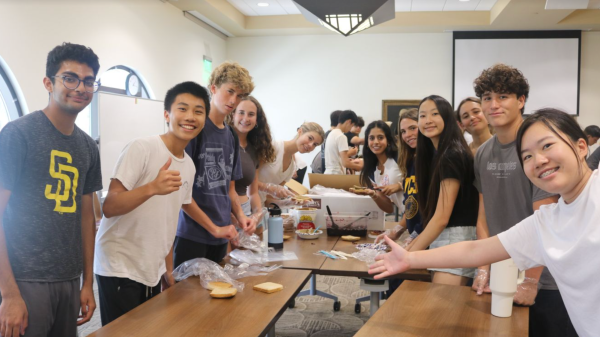
In addition to increasing workload, “teachers expect more independence,” Sajan Virdi (‘27) added, “which can sometimes catch people off guard. But I also think it depends on how you manage your time and take care of yourself. If you stay organized and don’t let everything pile up last-minute, it’s manageable. It’s challenging, for sure, but not impossible.”
One strategy that helped Ethan Yang (‘27) was planning out his homework schedule in advance so that it was more evenly distributed. “You might have some nights with just one and a half hours of work and some nights with six hours of work or even more if you don’t plan your time well,” he explained.
Ethan utilized checklists and Google Calendar — reliable systems for him to keep track of events. Ethan said, “Though different apps and methods work for different people, I would make sure to have a reliable way to organize all your due dates, tasks, or events.”
With the heavy workload and busy schedules, Angela explained, “The biggest mistake I made was not prioritizing sleep. We’re constantly told over and over again that sleep is extremely important, and sophomore year made me realize that it’s repeated to us for good reason.” It might seem necessary to stay up late when you feel underprepared before a big assessment, but Angela learned that studying late into the night “is far less beneficial than it seems, even when you think you need that last-minute studying the most.”
Maya Krishnan (‘27) viewed prioritization in terms of juggling glass balls (things you cannot drop) and plastic balls — it allowed her to have a clear view of what her goals were. Some of Maya’s glass balls were her classes, her family, and her sport. “In an ideal world, we would keep all of the balls in the air, but that’s not realistic, so prioritize what is important.”
Alongside academics, it’s important to be aware of your mindset and handle the peer pressure around you. Maya explained, “I felt compelled and obligated to take certain classes that ‘everyone’ was taking, when in reality, it wasn’t right for me. Don’t worry about what you feel like you ‘should’ be doing. Prioritize yourself, and your goals, and do what’s right for you.”
Eseosa Bello (‘27) described the “unnecessary worry” she had entering sophomore year due to “horror stories” she’d heard about certain classes. “I wish I had known to take everyone’s advice with a grain of salt. I went into sophomore year slightly scared based on what I’d heard about some of my classes and teachers, but I didn’t need to. Advice from upperclassmen is very valuable, but don’t forget that they involve that individual’s unique experience…take [them] as precautions, but don’t let them completely overrule your interests,” Eseosa said.
Moreover, sophomore year, which Sajan felt was one of the hardest and most important years of high school regarding college, “comes a level of anxiety induced by an obsession over grades.” Sajan said, “I hope future sophomores make sure to keep in mind that although they are important, they shouldn’t let a bad grade on a quiz or assignment make them feel like they’re failing as a student or as a person.”
10th Grade Classes
Honors Chemistry
“My hardest class this year was Honors Chemistry. I learned quickly that that is not a class you want to procrastinate in,” Maya Krishnan (‘27) explained. Alex Yang (‘27) added, “I was unprepared for the large jump from Physics, despite warnings from students from the previous year that it would be the hardest class of Sophomore year.” Last year’s sophomores found some helpful strategies.
In Honors Chemistry, students can fill out the blank spaces of a provided periodic table to use on their test. Maya recommended making your periodic tables “well in advance of a test,” to focus on studying practice problems. Ava Grandinetti (‘27) added that you could use your periodic table to solve practice problems, “making it easier to realize gaps in [your] knowledge.”
Maya emphasized the importance of doing practice problems before a test, saying, “If your teacher provides you with practice sheets, DO THEM ALL.” Alex Yang (‘27) added, “After reading and doing all the practice problems the [textbook] gives you (which isn’t too many), my next test scores increased dramatically.”
Ava and Sajan also found it helpful to study with classmates. Sajan described how creating a study group was crucial to his success in the class. “Having an inclusive environment in which we were able to study and learn from each other was something I found helpful throughout the year,” he said.
Honors U.S. History
Eseosa explained that watching videos from channels such as JocZProductions, Crash Course, and Heimler’s History helped her “truly understand the course material, remember chronological order, and connect topics, which helped especially for short-answer questions (SAQs) and timed writings.” She recommended watching these videos after knowing the facts and dates from your study guide, to highlight “nuances in the material,” find gaps in your understanding, and have a method to tie “several events together under one topic.”
Another specific tip Logan Yockey (‘27) mentioned was asking ChatGPT to give you practice tests or quizzes. “Before my final exam, I asked it not only to give me practice multiple-choice questions, but it also created 100 practice fill-in-the-blank questions. This helped me immensely as I learned the definitions of terms not only with Quizlet, but by practicing real test-like questions,” he explained.
Disclaimer: Be aware of your history teacher’s AI policies and make sure it is okay with them to use ChatGPT as a method of studying.
Ryan Park (‘27) also recommended focusing on context when studying for SAQs and timed writings — they require you to “connect the dots,” so alongside memorizing dates and names, study the context of the era they lived in.
11th Grade — Advice from the Class of 2026
“When I started junior year, I thought it was too late to explore new interests or try new activities. I was completely wrong,” Brad LaDrido (‘26) explained. “I’d argue junior year is meant for figuring out what you like and don’t like. If I could do it over, I would’ve thought more carefully about what I wanted to achieve with my time.”
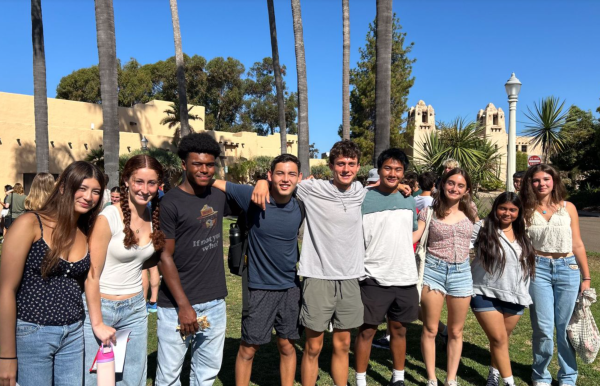
Brad’s thought process was asking himself, “What do I like right now? What do I not like? Why is that? And how can I explore what I like further? If you keep checking in with yourself this way, you’ll build a solid foundation, not just for college, but for understanding yourself better,” he said.
Brad added that “Junior year is when the college process starts to become real,” and one difference Maia Brunner (‘26) described is taking standardized tests.
Austin Hill (‘26) and Sophie Brunner (‘26) both regretted not taking the SAT earlier. Sophie explained, “I ended up being a lot busier than I anticipated, so it was hard to fit it in. I think it’s also just nice to get it out of the way, and it’s one less thing to worry about.” Austin added that he “had less time to prepare,” and had fewer tests available to take before he had to start college applications.
Another part of college applications is the letter of recommendation.“By establishing a strong relationship with your teachers and showing them that you enjoy their class, you provide them with more information to talk about, and they will want to spend time on your letter,” Austin explained. He suggested to “get to know your teachers well by going to office hours, asking questions, and making yourself stand out.”
Junior year is undoubtedly important and challenging. Brad explained, “The most popular rumor about junior year at Bishop’s is that it’s the hardest year yet.” However, Ariadne Georgiou (‘26), Maia, and Oliver Baum (‘26) all thought this rumor wasn’t true. Ariadne and Maia explained that it depends on the classes you take and the extracurriculars you do. Ariadne described her junior year as filled with “a whole range of activities that [brought her] joy and connection.”
Thus, choosing classes, as Oliver put it, is important. Because Oliver chose an honors class he wasn’t interested in, “when it came to needing to study, it was so much harder for me than other classes,” he said. Sophie added, “It’s a lot harder to do well in something that you have no interest in. The work really starts to compound, and it’s not good for your well-being in general. And if you can’t do it for your well-being, it’s a lot better for your grades when you’re not spending a bunch of time on classes that you don’t want to be taking.”
12th Grade — Advice from the Class of 2025
Managing time
1. Plan ahead
2. Prioritize things you’re passionate about
3. Don’t forget to have fun
Tips for college apps
1. Prepare for the emotional process
2. It’s okay to keep to yourself
3. Don’t underestimate yourself or undershoot your college list
4. Surround yourself with supportive people
5. Writing
Everyone takes time to adjust to a new school year, but a few pieces of advice from those who have just walked the winding path before you make the unknown much less daunting.


